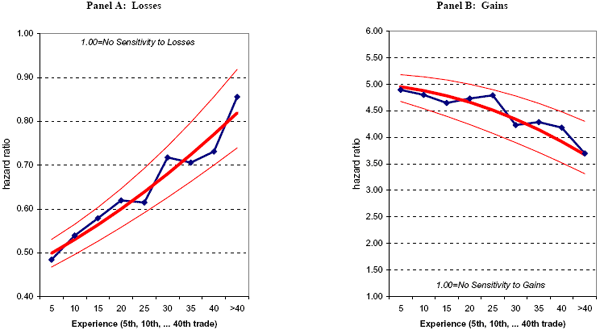In their March 2005 paper entitled “Do Investor Sophistication and Trading Experience Eliminate Behavioral Biases in Financial Markets?”, Lei Feng and Mark Seasholes analyze how sophistication and trading experience of investors affect their disposition behavioral bias (reluctance to realize losses and propensity to realize gains). They define sophistication based on four factors: number of trading rights; initial level of portfolio diversification; age; and, gender. They define trading experience as the number of positions taken since account initiation. Using data from a national brokerage firm in the People’s Republic of China for 1,511 individual accounts initiated on or after 1/1/99 and monitored through 12/31/00, they conclude that:
- Sophisticated investors are at least 67% less prone to the disposition effect than the average investor. Sophistication better mitigates the reluctance to realize losses than the propensity to realize gains.
- Trading experience alone reduces the disposition effect by as much as 72%. As for sophistication, trading experience better mitigates the reluctance to realize losses than the propensity to realize gains. (See the charts below.)
- Sophistication and trading experience together tend to: (1) eliminate the reluctance to realize losses; and, (2) reduce (by 37%), but not eliminate, the propensity to realize gains.
- There may be some other behavioral bias applicable to realized gains that makes that half of the disposition effect less susceptible to mitigation through learning.
The following charts, extracted from the paper, illustrate how both aspects of the disposition effect attenuate with increased trading experience. Trading experience is the cumulative number of trades executed by an investor. Hazard ratio indicates how willing investors are to sell. A hazard ratio of zero means complete unwillingness. A ratio of one means no unusual unwillingness. A ratio greater than one indicates eagerness to sell.
In summary, sophisticated and experienced investors/traders avoid most of the bad effects of the disposition bias. Trading practice helps.
